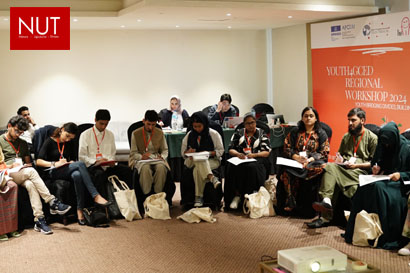Regional Workshop Begins in Lahore, Inspiring South Asian Youth Through Global Citizenship Education and Cultural Exchange.
The Youth4GCED Regional Workshop launched with great enthusiasm on its first day, setting the stage for a transformative experience in Global Citizenship Education (GCED), cultural exchange, and youth-led initiatives in social justice. Organized by The Little Art, UNESCO APCEIU, and the GCED Youth Network, the workshop brings together over 25 young leaders from seven South Asian countries to collaborate, learn, and shape a collective Youth Declaration aimed at addressing critical issues within their communities and beyond. Participants immediately engaged in activities designed to inspire critical thinking, social responsibility, and intercultural dialogue. Day one focused on collaborative discussions, expert-led sessions, and hands-on learning that ignited meaningful conversations around the power of education and community-driven change. Dr. Tania Saeed, Associate Professor at LUMS, underscored the impact of storytelling in GCED as a bridge between South Asian communities. Sharing children’s storybooks crafted by Pakistani students and illustrated by local women artists, she highlighted themes such as minority representation, environmental and animal rights, and housing justice, saying, “Through storytelling, we can foster an inclusive vision for South Asia, one that empowers young people to connect beyond borders and see their shared humanity.” Zafar Hayat Malik, Head of Education at UNESCO Pakistan, shared insights on UNESCO Pakistan’s educational initiatives and their commitment to youth empowerment. “UNESCO is dedicated to promoting inclusive, quality education and engaging youth in addressing social challenges across Pakistan. This workshop reflects our vision to inspire and equip young leaders to drive impactful change within their communities,” he said. Rafi Jaffer, International Youth Development Expert, discussed both challenges and opportunities in South Asia by conducting an interactive activity called “the test” where he divided the participants into two different but unequal groups. Along with the activity he talked about GCED, noting, “With our region’s cultural diversity and social challenges, GCED can have a transformative impact. It provides youth with the framework to address global goals with solutions rooted in their local realities.” Sukyung GO, program specialist from UNESCO APCEIU, The Asia-Pacific Centre of Education for International Understanding (APCEIU) is proud to co-organize the Youth for Global Citizenship Education (GCED) workshop in Lahore, Pakistan. This engaging event united young leaders from across the region, providing a platform for dynamic discussions and interactive activities aimed at deepening their understanding of global citizenship. Participants not only enhanced their skills and expanded their networks but also collaboratively drafted a Youth Declaration on GCED, reflecting their insights and commitments to advancing these initiatives. From the GCED Youth Network, Diego from Guatemala expressed the value of the workshop for young leaders in South Asia: “The Youth4GCED Regional Workshop is a unique opportunity to enable contextualized learning and interaction on key priorities for youth in this region. It’s the first workshop of its kind, providing access that is often out of reach for many young people here. This youth-led, youth-centered experience allows regional youth to build their learning journey together, to engage, and to develop skills and perspectives that can transform their work back home.” Noora from Egypt, core team of GCED Youth Network, highlighted the impact of cultural exchange, fostering mutual understanding and empathy across borders adding, “Creating connections across borders builds understanding and empathy. Through these exchanges, we’re breaking down barriers and strengthening our communities to address global challenges together.” With an inspiring first day completed, participants will continue to work on the Youth Declaration, dive deeper into the United Nations Sustainable Development Goals (SDGs), and explore how innovative thinking and emerging technologies can contribute to a more sustainable future for South Asia. This workshop aims to empower youth as leaders of change, champions of social justice, and advocates for sustainable development across their communities.

